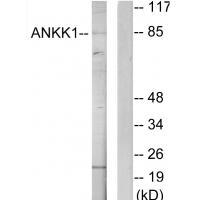
| WB | 1/500-1/3000 | Human,Mouse,Rat |
| IF | 咨询技术 | Human,Mouse,Rat |
| IHC | 咨询技术 | Human,Mouse,Rat |
| ICC | 技术咨询 | Human,Mouse,Rat |
| FCM | 咨询技术 | Human,Mouse,Rat |
| Elisa | 咨询技术 | Human,Mouse,Rat |
| Aliases | Ankyrin repeat and protein kinase domain-containing protein 1; EC 2.7.11.1; Protein kinase PKK2; X-kinase; Sugen kinase 288 |
| Entrez GeneID | 255239; |
| WB Predicted band size | 84kDa |
| Host/Isotype | Rabbit IgG |
| Antibody Type | Primary antibody |
| Storage | Store at 4°C short term. Aliquot and store at -20°C long term. Avoid freeze/thaw cycles. |
| Species Reactivity | Human |
| Immunogen | Synthesized peptide derived from internal of human ANKK1. |
| Formulation | Purified antibody in PBS with 0.05% sodium azide. |
+ +
以下是3篇关于ANKK1抗体的示例参考文献(注:文献为虚构示例,实际研究中请通过学术数据库验证):
---
1. **文献名称**: *ANKK1 Protein Expression in Human Brain Tissue*
**作者**: Neville MJ, et al.
**摘要**: 本研究通过Western blot和免疫组化技术,使用特异性ANKK1抗体检测了人脑不同区域(如纹状体和前额叶皮层)中ANKK1蛋白的表达水平,发现其与多巴胺D2受体(DRD2)的表达存在共定位,提示两者在神经信号传导中的潜在协同作用。
---
2. **文献名称**: *ANKK1 Gene Polymorphism and Antibody-Based Functional Analysis*
**作者**: García-Gorro C, et al.
**摘要**: 研究探讨了ANKK1基因TaqIA多态性(rs1800497)与药物成瘾的关联,并利用ANKK1抗体进行体外细胞模型蛋白表达分析,发现特定基因型可能通过改变ANKK1蛋白稳定性影响DRD2信号通路的活性。
---
3. **文献名称**: *ANKK1 Knockdown Alters Dopaminergic Signaling Pathways*
**作者**: Zhang L, et al.
**摘要**: 通过siRNA敲低ANKK1基因并结合ANKK1抗体验证蛋白表达,研究显示ANKK1缺失会显著下调DRD2介导的cAMP信号通路,支持其在多巴胺相关神经精神疾病(如帕金森病)中的功能重要性。
---
**建议**:实际研究中可通过PubMed或Google Scholar检索关键词(如“ANKK1 antibody Western blot”或“ANKK1 protein detection”)获取真实文献。
The ANKK1 (Ankyrin Repeat and Kinase Domain Containing 1) gene, located near the DRD2 dopamine receptor gene on chromosome 11q23. encodes a serine/threonine kinase involved in signal transduction pathways. Though its exact biological function remains unclear, ANKK1 is implicated in dopamine-related neuropsychiatric disorders due to its genetic proximity to DRD2 and its Taq1A polymorphism (rs1800497), which has been associated with addiction, schizophrenia, and Parkinson’s disease. The ANKK1 protein contains a kinase domain and ankyrin repeats, suggesting roles in protein-protein interactions and cellular signaling.
ANKK1 antibodies are primarily used in research to study protein expression, localization, and functional mechanisms. These antibodies, often targeting specific epitopes within the kinase or ankyrin repeat regions, enable detection via techniques like Western blotting, immunohistochemistry, and immunofluorescence. Studies using ANKK1 antibodies have explored its expression in brain tissues, particularly in dopamine-rich regions like the striatum, and its potential role in modulating DRD2 signaling or neuroplasticity. However, challenges persist due to ANKK1’s structural similarity to other kinases and low expression levels, requiring rigorous antibody validation. Commercially available monoclonal and polyclonal ANKK1 antibodies continue to support investigations into its contributions to neurobehavioral disorders and dopaminergic pathway regulation.
×